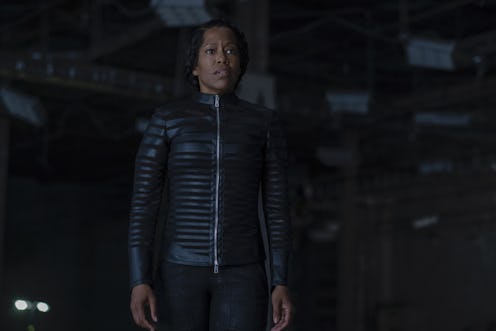
Spoilers for Watchmen Episode 9. Watchmen ends how it begins: with an egg. In Watchmen's final episode, Lady Trieu succeeds in capturing and killing Dr. Manhattan (with the help of the 7th Kavalry, who she was manipulating all along). It's a tragic ending for the character, but then the show leaves us with an intriguing twist: Angela might have Dr. Manhattan's powers now if the repeated egg imagery throughout the season means anything.
Eggs are a mainstay in Damon Lindelof's Watchmen, and that imagery carries through all the way until the end. In the final moments of the show, Angela returns home, tucks her kids in, and mourns the love of her life. She then bends down to pick up the shattered eggs on the floor, which she broke in front of Dr. Manhattan hours prior. She definitely threw them with enough force to destroy them all, and yet inside she finds one perfect egg, which looks like it has a very vague bruise, almost like a finger mark.
That one egg causes Angela to recall the conversation she and Jon had when they met in a bar ten years ago.
"So that's at thing you can do? Give someone your powers?" Angela asked him.
"I suppose I could transfer my atomic components into some sort of organic material," Jon mused. "If someone were to consume it, they would inherit my powers."
"So you could put them in this egg, and if I ate it, I could walk on water?" Angela asked.
"Theoretically, yes," Jon said.
Just like how Jon consumed the raw egg that Angela broke for him in the bar, so too does Angela drink the raw egg that Jon (possibly) left for her. Angela then sticks her foot out over her pool, but before we can see if she can walk on water, the screen cuts to black, Inception-style.
Though we never get to see Angela become the next Dr. Manhattan, all clues point to the transfer succeeding. This is a show all about legacy and the cyclical nature of history, after all.
Angela inherited both the trauma and memories of her grandfather Will, and her Sister Night is like Hooded Justice reborn. Lady Trieu inherits the genius of her father Adrian Veidt, and she in turn passes on her knowledge to Bian, her cloned and reincarnated mother. Laurie Blake takes on her father's name, and ultimately does in Watchmen what she failed to do in the comic: hold Veidt accountable for his crimes. Within this context, it would make sense that Dr. Manhattan dies, only to have his powers be reborn in someone else.
The egg is the perfect imagery to demonstrate this cycle of death and rebirth. Eggs are, on their own, life itself. But when consumed, they also give life in the form of nutrition. This is why the first episode features Angela forming the yolks into a smiley face: she reimagines the Watchmen icon to be a symbol of life, rather than of death, as it is in the comics. (The smile comes from a bloody pin found on the body of the deceased Comedian.)
This double meaning of birth and rebirth plays throughout Watchmen and reinforces the show's core themes. We see Will making eggs as he talks to Angela, in the same episode where she learns he's actually her grandfather. We also watch Lady Trieu offer a newborn baby to an infertile Oklahoma couple who sell eggs from their farm. "Legacy isn't in our land. It's in our blood," Trieu says, which speaks both to Angela and Will's relationship, but also to how Dr. Manhattan's powers will likely absorb into Angela as well.
The phrase "you can’t make an omelette without breaking a couple of eggs" is repeated in Watchmen, first with Laurie's story and then with Dr. Manhattan and Angela. It speaks to the very nature rebirth: yes, on one level it's sad that the eggs break, and that their breaking signifies life lost. But on another level, put several eggs together and it makes an entire meal for another living being.
Yes, this is a bit morbid — and definitely so in the context of when Laurie first says the joke — but it's also a true fact. This also again inverts the theme of the graphic novel: Laurie first says the line to refer to Veidt's cavalier attitude towards killing three million people. But when Dr. Manhattan says it, it's an allusion to Angela's new life.
Of course, with all this said, Jon could have been wrong about the transfer working, as he was wrong about Angela loving Doris Day's "Tunnel of Love." We also don't know yet if Watchmen will get renewed, so this season is meant to function as a standalone, and essentially end on a cliffhanger.
The textual evidence laid out by the show suggests Angela did inherit his powers, though. In the end, if Angela becomes Dr. Manhattan, it just continues the main ideas behind Watchmen: that time is an ouroboros, and that things that end are destined to begin again. As Dr. Manhattan tells Veidt in the final moment of the comics, "Nothing ever ends."